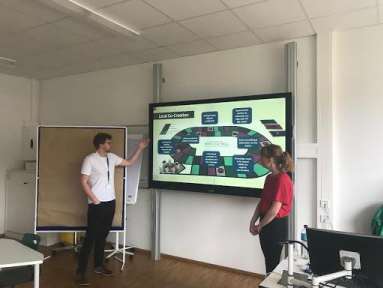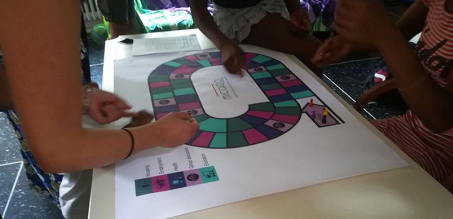 https://www.synyo.com/wp-content/uploads/SYNYO-NEWS-featured-image-NEW01007705EN.png
400
459
leo
https://www.synyo.com/wp-content/uploads/2017/09/synyo-logo.png
leo2025-01-01 10:47:112025-02-10 10:48:51BOND: Outcomes in Advancing Education, Tolerance and Heritage Preservation to combat Antisemitism
https://www.synyo.com/wp-content/uploads/SYNYO-NEWS-featured-image-NEW01007705EN.png
400
459
leo
https://www.synyo.com/wp-content/uploads/2017/09/synyo-logo.png
leo2025-01-01 10:47:112025-02-10 10:48:51BOND: Outcomes in Advancing Education, Tolerance and Heritage Preservation to combat AntisemitismMICADO

Gathering user requirements for the MICADO integration app
The development of MICADO apps is based on a co-creation approach that involves migrants, administrations and NGOs. Local co-creation workshops were implemented in the pilot cities of Hamburg, Antwerp and Bologna.
The MICADO social scientists ran a co-creation process in the form of a game aiming to gather user requirements for the MICADO apps. The co-creation game was created in an inclusive manner, ensuring accessibility and understandability for all user groups represented in MICADO – migrants, representatives of civil society organizations, and of public administrations –
Co-creation activities started in Hamburg at the Hafen City University, with the kick-off event for the Local Expert and Stakeholder Committee (LESC) on June 19, 2019.The LESC group present at the meeting included 50 stakeholders from public administrations and non-governmental associations.
After an informal welcome session, in which the MICADO project was introduced by Prof. Jörg Rainer Noennig, Marie Malchow and Dr. Jan Barski from HCU, participants had the opportunity to ask questions. In a next step, members of public administrations and NGO representatives formed two groups. Both groups received briefings on the co-creation methods in separate rooms. The public workers were asked to gather information on the types of data needed to improve their respective work. NGOs representatives received information on the games planned for prospective co-creation workshops for NGOs and migrants.

Co-creation activities in Hamburg
After the meeting, researchers of the HCU team conducted six interviews with civil service members regarding the use of ICT in their daily work on migrants’ integration. Furthermore, five co-creation and co-design workshops were conducted with migrants, and one with NGOs. During the workshops, the participants were asked about difficulties they have faced when first arriving in Hamburg to better understand what is needed by newly arrived migrants.
The workshops and interviews provide important inputs for the technical development of the apps. By involving end users in the creation process, the developers can ensure that the created product will meet the needs and demands of migrants and of people facilitating the integration of new arrivals. Understanding the real needs of migrants is the first step to identify feasible and useful technological solutions, able to concretely respond to their most relevant demands in the local context.
ASP City of Bologna and University of Bologna carried out together the co-creation process. These activities were realized through workshop involving four different groups of migrants – asylum seekers, female migrants, relatives of migrants and long-term migrants – and local stakeholders and through interviews with public authorities. During the workshops, participants mentioned their interest in having access to more job opportunities, to enhance their employability and to have a good education. From their point of view, improving access to work and education is the best way to face the challenge of integration. The participants also iterated their willingness to cooperate with the MICADO project in the future and to test the MICADO solution.

Co-creation activities in Bologna
These first co-creation activities are just the beginning of a continued engagement with stakeholders during the whole course of the project. Regular communication via newsletters will facilitate continued collaboration, provide information on the project progress and will be used to gather feedback from the local stakeholders in Hamburg and the team of researchers and developers of MICADO.




